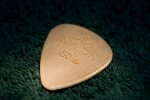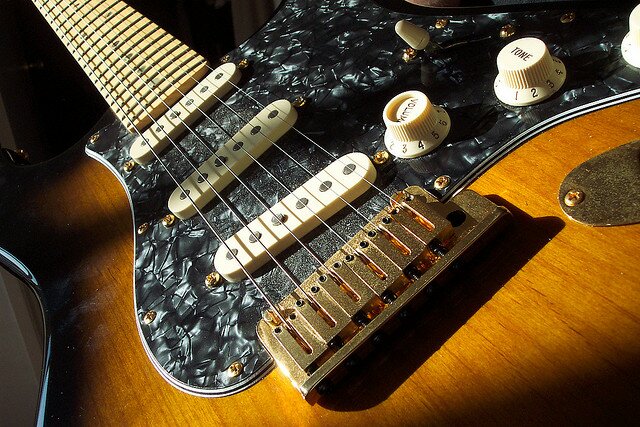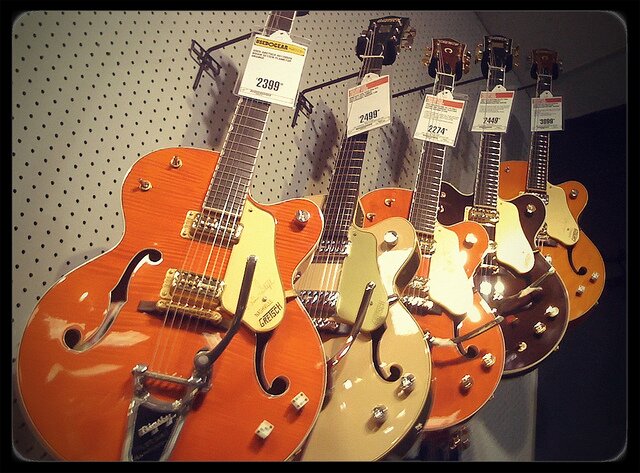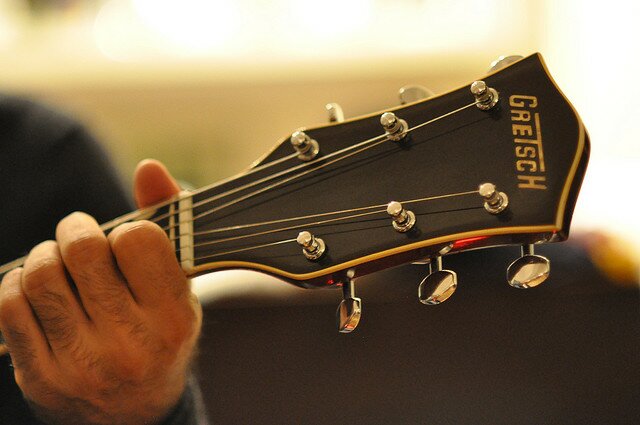Surviving Your First Guitar Purchase – With Hobgoblin Music

Buying your first guitar can feel like a confusing minefield of choices. Without prior knowledge, new players face the risk of spending a significant amount of hard earned cash on the wrong gear. That’s obviously no good and with a bit of sensible guidance can easily be avoided.
Like so many things in life a lot of getting a successful first purchase comes down to doing your homework and considering your options carefully. Thankfully, the world of guitars is full of some excellently kind people including Drew from HobGoblin Music.
Enjoy and happy shopping!
Hey Hobgoblin, thanks for getting involved! Could you introduce yourselves and what you’re all about?
We are a folk instrument specialist, employing some of the most knowledgeable and passionate musicians in the UK. Our shops have all the things you would expect from a music shop and even more things you wouldn’t expect. We love music and we share that with everyone that comes in to our shops.
Buying your first guitar can be quite daunting – there’s not only the guitar, but accessories, amps and plenty of exciting toys you can splash your cash on. What’s your advice to someone researching their first purchase?
Don’t be afraid to ask questions. A good music shop will never be judgemental towards a novice and a great music shop will set you on the road towards being both knowledgable and enthused. Talking to people in a shop is always great for research as they are around instruments all the time and often times have been playing for years if not decades. But most importantly, they will remember what it was like to be a beginner as well. We always look after people who are new to something.
How have you seen the beginner market change over the years? What kinds of people do you see getting started?
All shapes and sizes! Both young and old are either just starting, coming back after a hiatus, or trying their hand a different kind of fretted instrument. Folk has become very popular over the past decade and now more than ever acoustic instruments are what beginners are looking for. They allow you to just pick up and play without the need for hunching over an amp or untangling cables.
What are the biggest mistakes you see people making when buying their first guitar, and how can people avoid the common traps?
The most common ‘trap’ is rigidly fixating on one brand or another. My mate says get an ‘X’, or my favourite guitarist plays ‘Y’. Sometimes there is value in this but, in my experience, not often enough to rely on. The road less travelled sometimes offers the most adventure and inspiration, and can yield treasures others haven’t found yet. Remember; always buy an instrument and not just a brand.
Let’s say someone’s dipping their toes in the water and wants to get cracking without risking too much money. What would you suggest?
As I said earlier, the acoustic guitar is a very economic way to start as you have everything you need -bar a few optional accessories- to get started right there. Getting an acoustic featuring a ‘solid top’ is a good choice. This means that the piece of wood on the guitar that does most of the sound generation is a nice cut of solid tone-wood, and not sheets of ply. This will make the instrument sound nicer, but even more importantly, solid wood matures and improves the more you play. That means your new guitar will be getting better the whole time you’re getting better!
Second hand instruments are clearly a wise choice for someone not wanting to spend too much money. What should someone check when looking for a used guitar?
Never buy without playing it first – used guitars aren’t always looked after by their original owner. I never buy a second-hand guitar for my shop that I wouldn’t buy myself for the price I’m selling it at. Check for extreme fret-wear; this is caused by the strings wearing away the frets over years (or months if you are very heavy handed!) of use. You will see little valleys carved into the frets. Too much wear can make a guitar almost unplayable and can be expensive to fix.
Check the neck; A good way of checking is holding down the bottom E string on the 15th fret, and then placing another finger on the 9th fret. Ideally there will be a ½ – 1 millimetres movement for that string if the neck is in roughly the state it should be in.
Also, very importantly: place an ear on the guitar itself and hum a simple and soft-to-the-point-of-inaudible tune that comes from the heart. If you then hear an anguished lamentation or you notice your shoelaces being untied by some unseen eldritch force, the guitar might have angry ghosts living in it. Any good on-site guitar-tech will know what to do with that, so don’t fret (haha! Get it?).
In seriousness though, we do generally tell people that ‘secondhand doesn’t necessarily mean cheaper’ – there are penty of special and unique vintage secondhand items that can be a lot higher end, and plenty of beginner’s guitars on the market (even with solid tops) at very affordable prices.
-Drew








